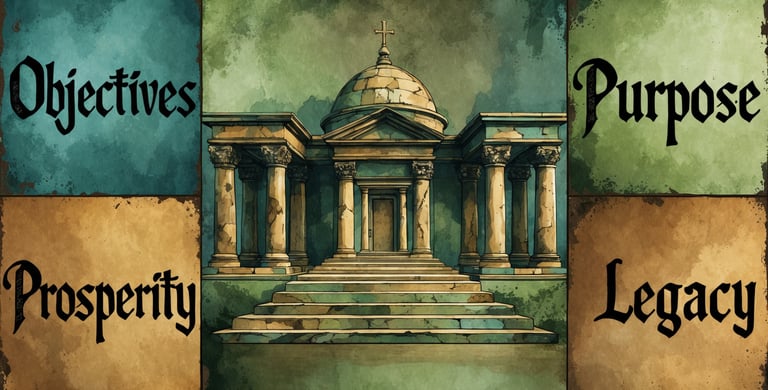How to Choose Between Two Right Opportunities Without Regret
A Tactical Guide for Men Who Must Choose Between Honor and Honor
4FORTITUDEO - OBJECTIVES, PURPOSE, PROSPERITY, LEGACY
How to Choose Between Two Right Opportunities Without Regret
A Tactical Guide for Men Who Must Choose Between Honor and Honor
“If a man knows not to which port he sails, no wind is favorable.”
— Seneca
The Greatest Decisions Are Not Between Good and Evil—but Between Two Good Paths
The most paralyzing decisions a righteous man faces are not moral crises.
They are multi-path alignments, where both options are good, holy, and honorable.
Take a new role or deepen the current one?
Expand the ministry or fortify the home?
Stay in the city or retreat to the land?
Serve this man or serve that mission?
These are not decisions of sin—they are decisions of structure. And structure is destiny.
A foolish man chooses for comfort.
A double-minded man delays until the choice is made for him.
A faithful man chooses with fire in the soul and clarity in the spine.
🧱 Why “Two Right Options” Are So Dangerous
1. Both Appeal to Your Oath
Each one:
Feels aligned
Resonates with your values
Could be used by God
Is justifiable to your family, mentors, or followers
This creates moral paralysis disguised as prudence.
2. You Fear Missing God’s Perfect Will
You were taught that:
God has “one path”
If you miss it, you’ll live in divine disappointment
You must wait until you “feel peace”
But this theology creates passivity. It traps men in false piety.
The truth?
God often gives you multiple right paths—to test your decision-making, not to punish your discernment.
3. You Know It Will Cost You Something Either Way
Unlike right vs wrong decisions, choosing between two right opportunities always requires sacrifice.
One will cost time with family
The other will limit external impact
One offers provision, the other formation
One gives rest, the other reputation
There is no perfect outcome. There is only righteous alignment.
⚔ The 5-Part Tactical Framework for Choosing Between Two Right Paths
🔱 1. Return to the War Map
Ask:
“Which opportunity most deeply aligns with the vow I’ve already made?”
Your family mission
Your written calling
Your structure of responsibility
If neither path aligns, the real answer may be delay or refusal.
If one path strengthens your current vows and the other pulls you into a new direction—you must choose the vow unless God speaks clearly otherwise.
🧭 2. Discern the Root Assignment
Ask:
What is this opportunity asking of me in the spirit?
Is it an expansion of my mission or a replacement of it?
Which role does this opportunity amplify: Father? Shepherd? Builder? Strategist?
Every opportunity will shape your identity in a direction. One will multiply your gravity. One will dilute your posture.
🛡 3. Project the Legacy Impact
Ask:
In 10 years, what will this choice teach my children?
If I die in a year, which choice prepares my household better?
Which path would I be proud for my son to inherit—even if it bore no fruit in my lifetime?
Legacy is not built by convenience—it is built by commitment.
🔥 4. Submit to Friction, Not Fantasy
Most men make decisions by imagining the best version of each path.
But that is a lie.
You must imagine the worst days of each path—and ask: “Which pain am I willing to suffer?”
Missed birthdays?
Ministry slander?
Obscurity?
Failure in public?
The right path is not the one with less pain. It is the one where you can suffer with purpose.
🕯 5. Seek the Voice in Silence—Then Obey Quickly
Once you’ve processed the above:
Fast for one day
Ask only this: “God, which path honors You more fully in this season?”
Listen for clarity—not comfort
Then: act within 72 hours
You are not God’s experiment. You are His ambassador. Your clarity will increase after your obedience—not before.
🧠 Counterperspectives and Strategic Response
Objection: But what if I regret it later?
Response: You might. But if you chose in alignment, regret is irrelevant. You obeyed the best light you had. That is holy.
Objection: What if I fail on the path I choose?
Response: You will be judged on your obedience, not your outcomes. God trains generals through failed campaigns.
Objection: I don’t feel peace about either one.
Response: Peace is not the prerequisite for action. Peace often follows obedience—especially when sacrifice is involved.
🛠 Tactical Summary
Step 1 – War Map
Review all core vows and mission documents
Step 2 – Assignment Clarity
Identify which path aligns with your archetype
Step 3 – Legacy Impact
Project outcome through your children’s eyes
Step 4 – Friction Tolerance
Choose the cross you’re built to carry
Step 5 – Obedience Window
Fast, decide, and act within 72 hours
Wisdom and Warning
If you refuse to choose:
You will become passive, waiting for certainty that never comes
You will teach your sons to avoid weight-bearing decisions
You will drift into roles chosen by the demands of others
If you choose in structure:
You will walk in gravity
You will build rhythm around the path you chose
You will lose less time, even if the cost is high
The man who chooses from alignment cannot be shaken by consequences.
Final Charge
You were not designed to guess.
You were designed to discern, decide, and declare.
Between two good paths, only one will build the man you are called to become in this season.
Pick up the one that stretches you into further obedience. And walk—without apology, without delay, without fear.
Irreducible Sentence
The righteous man does not regret the cost of obedience—only the delay in offering it.


